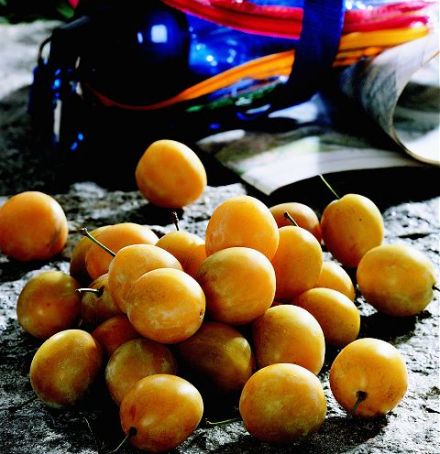 |
All About Yellow Plums > The fruit for athletes
With its high natural sugar content, the yellow plum is one of best fruits for providing energy
Energy to move better
With its high natural sugar content - at least 16% when perfectly ripe - the yellow plum provides a source of energy that is easily accessed by all the body's cells. It's the perfect snack for athletes to take along! When you're hiking or playing sports, a few yellow plums can prevent drops in energy and an empty feeling, and yet they're reasonable in terms of calorie content.
Fifteen yellow plums (about 100 g) contain just 65 calories, or 4% of your daily requirement.
What do nutritionists say? "Throughout their development, yellow plums store up juice and flavor and concentrate nutrients in their pulp. They've benefited from exposure to sunlight, which allows them to naturally synthesize carbohydrates. They are one of the fruits that contain the most carbohydrates, evenly balanced among glucose, fructose and saccharose, with small amounts of other rarer sugars, such as pentose or sorbitol."
Vitamins to nourish your skin from the inside out
While we manage our tanning using protective creams, we shouldn't forget that the skin also has to be nourished and protected from the inside. Yellow plums can help us do so, because they're a significant source of provitamin A. This carotenoid pigment is transformed into 7 A vitamins in the body and plays an important role in the integrity of our skin. The more reddish patches a yellow plum has, the higher its vitamin A content. Yellow plums provide the whole range of B group vitamins for proper skin cell renewal. They help ensure healthy skin and an attractive complexion.
Why do nutritionists say? "Yellow plums also contain other pigments (anthocyans and flavonoids) that increase the resistance of our small blood vessels. They reduce the tendency of some skin types to redden with heat."
Sorbitol, a specific carbohydrate for a flat stomach
High in fiber (above 2%) which is well-tolerated by the body since it is composed mostly of pectin, yellow plums promote proper intestinal function. A few yellow plums for breakfast... a proven recipe!
What do nutritionists say? "Yellow plums provide sorbitol, a specific carbohydrate that increases the action of fiber on intestinal transit. It stimulates bile secretion, which gives it slightly laxative properties."
A concentrate of minerals and trace elements.
With more than 500 mg of minerals and trace elements per 100 g, yellow plums provide a wide spectrum of our mineral and trace element needs. As they slowly ripen, yellow plums store up potassium, phosphorus, magnesium, iron, copper, manganese, zinc, cobalt, molybdenum, iodine, fluorine, nickel, selenium, etc. They are supplied in concert, in easily assimilated natural forms, and in physiologically useful doses.
What do nutritionists say? "Minerals and trace elements are valuable for the proper functioning of the entire body. They play a role in cellular exchange, in the enzymatic systems, and in regulating major body functions. Some of them have more than one specific role which makes them important in 'preventive eating.'"
For example:
• a diet rich in potassium can reduce cardio-vascular risk for people suffering from hypertension (by reducing their blood pressure)
• zinc, as a component of the enzyme that is most effective in fighting free radicals, plays a part in preventing premature cell aging
• selenium acts as a powerful anti-oxidant and plays a beneficial role in preventing certain cancers and cardiovascular diseases.
All of these elements are well-represented in yellow plums.

-

 Recipes
Recipes
-

 Products
Products
-

 Entertaining
Entertaining
-

 Chefs
Chefs
-

 Hints & Tips
Hints & Tips
-

 Glossaries
Glossaries








